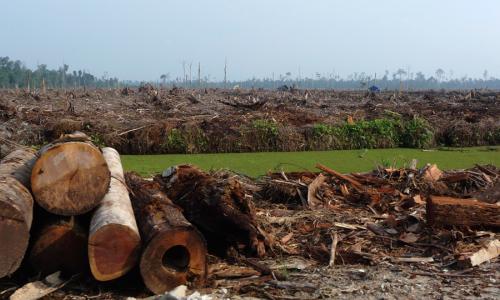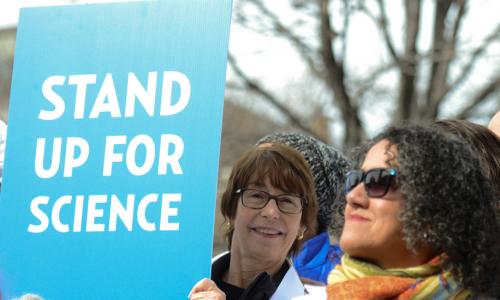We already know we are putting too much heat-trapping carbon dioxide (CO2) into the air when we burn fossil fuels to generate electricity, fuel our cars, and heat our homes—but by cutting down and burning trees, we are also releasing an astounding amount of the same heat-trapping carbon dioxide into the atmosphere. Tropical deforestation accounts for about 10 percent of the world's global warming pollution.
Here are just 10 reasons why investing in forest protection initiatives is in the nation's best interest:
1. Global warming is global.
Every molecule of CO2 traps heat in Earth’s atmosphere, regardless of whether the CO2 comes from the tailpipe of a car, the smokestack of a coal-fired power plant, or the burning of a tropical tree. Thus, to address global warming, we need to reduce the CO2 produced everywhere on Earth, not just in the United States.
2. Tropical forest emissions are significant.
About 10 percent of carbon emissions come from tropical deforestation—equivalent to the annual tailpipe emissions of 600 million average U.S. cars. Deforestation is happening at an alarming rate—an acre of tropical forest every second. We cannot address global warming effectively if we ignore 10 percent of the problem.
3. Global warming solutions protect our citizens.
We pay for climate disruption every day in the form of hurricanes, droughts, floods, heat waves, and other dangerous weather events that pose significant health and economic risks. These risks will grow more severe if CO2 emissions continue to increase. Addressing global warming today will save lives and money for years to come.
4. Tropical forests are necessary for stabilizing our climate.
Tropical forests not only provide oxygen for us to breathe, but also take CO2 out of the atmosphere and store much more carbon than forests in temperate regions (like those in the United States). Losing such forests greatly hampers Earth’s ability to remove carbon from the atmosphere and avoid the worst effects of global warming.
5. Reducing deforestation is cost-effective.
Economic analyses have shown conclusively that reducing emissions from deforestation is considerably less expensive than reducing emissions from fossil fuel combustion and other industrial sources.
6. Ignoring deforestation is unfair for good businesses.
Timber from tropical deforestation, and particularly illegal deforestation, undercuts landowners who are managing their forests sustainably. By reducing tropical deforestation, we reduce unfair competition with ecologically sound forestry.
7. Reducing deforestation is inexpensive for the United States.
Analyses from the Union of Concerned Scientists, the European Commission, and the government of Great Britain all agree that for about $20 billion per year, deforestation-related emissions can be cut in half by 2020. The United States would need to contribute only $5 billion—about 25 percent of the total global investment or just 0.1 percent of the annual U.S. budget—to help get the job done.
8. Solutions exist today for reducing deforestation.
Tropical countries are not waiting to reduce deforestation. Brazil, for example, has reduced its deforestation-related emissions by two-thirds in just six years, and Indonesia, a large emitter of global warming pollution because of high rates of deforestation, has pledged to cut overall emissions by more than 25 percent by 2020. Other tropical countries are implementing “pay for performance” systems in which they will only receive compensation after they reduce their emissions. Increased investment in forest protection measures can help ensure there are many more success stories like these.
9. Stopping deforestation addresses multiple challenges.
Preserving tropical forests helps protect the millions of plant and animal species—many of which have been invaluable to human medicine—that are indigenous to tropical forests and in danger of extinction. Keeping forests intact also helps prevent floods and drought by regulating regional rainfall. And because many indigenous and forest peoples rely on tropical forests for their livelihoods, investments in reducing deforestation provide them with the resources they need for sustainable development without deforestation.
10. Addressing deforestation shows we are serious about our future.
To protect the world that our children will inherit from us, we must act swiftly to reduce global warming emissions both here and abroad, and from all sources.




